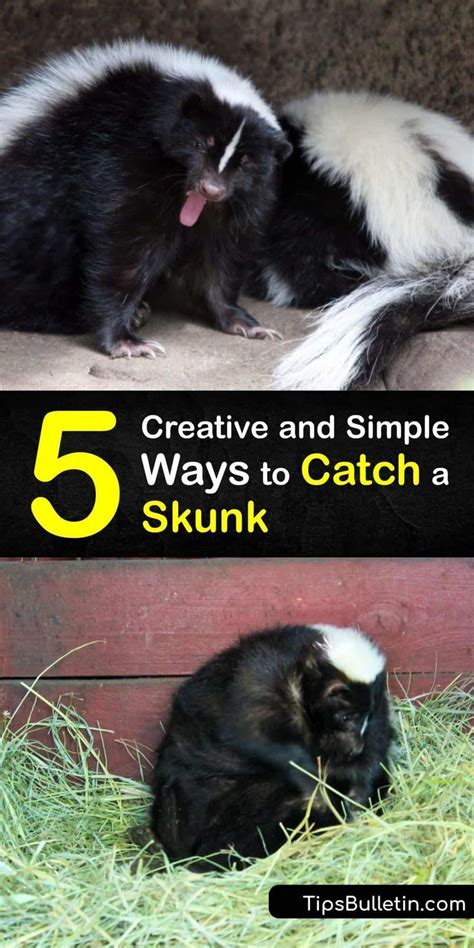Simple Egg Bait: Get Rid of Garden Skunks
Skunks are undeniably charming creatures, but their presence in your garden can quickly turn from endearing to a nuisance. Their nocturnal foraging habits often lead to ravaged gardens, leaving behind a trail of destruction and a lingering unpleasant odor. While humane removal is always the preferred method, deterrents like simple egg bait can be effective in discouraging these critters from making your yard their midnight buffet. This article explores the effectiveness of this method and provides you with a comprehensive guide to dealing with garden skunks humanely.
How Effective is Egg Bait for Skunks?
The effectiveness of egg bait lies in exploiting skunks' natural scavenging instincts. The theory is that skunks, attracted by the scent of rotten eggs, will consume the bait, and the resulting unpleasant experience (due to the smell and potentially digestive discomfort) will deter them from returning. However, it's crucial to understand that this isn't a foolproof solution. Some skunks might be undeterred, while others may find the bait appealing despite the unpleasant consequences. Therefore, it's best considered as a supplementary method, part of a broader strategy for skunk control.
What is the Best Way to Use Egg Bait?
There isn't one single "best" way, as effectiveness depends on several factors, including the skunk's individual preferences and the severity of the infestation. However, here are some tips for maximizing the chances of success:
-
Placement is Key: Place the egg bait strategically in areas where skunks have been active, such as near garbage cans, compost piles, or areas where they've dug. Multiple bait stations may increase your chances of success.
-
Rotten is Better: Don't use fresh eggs. The stronger the smell of rotten eggs, the more likely it is to attract and repel skunks. Allow eggs to rot for several days to a week before deploying them.
-
Avoid Traps: Do not place the eggs in any kind of trap. Humane and ethical treatment is paramount. The goal is to deter, not harm the animal.
-
Combination Approach: Egg bait is most effective when combined with other deterrent methods. This could include securing garbage cans, removing potential food sources, and using commercial skunk repellents.
-
Regular Monitoring: Observe the bait stations regularly to assess their effectiveness. If the eggs are consumed without any apparent deterrent effect, you might need to consider more robust strategies.
What Other Repellents Can I Use?
Egg bait should be part of a larger strategy. Here are some other effective repellents:
-
Commercial Repellents: Many commercially available repellents are designed to deter skunks using strong scents. These often contain ingredients like capsaicin (the active component in chili peppers), which skunks find unpleasant.
-
Motion-Activated Sprinklers: These devices scare skunks away using a sudden burst of water when they approach. They're particularly effective in areas where skunks frequently trespass.
-
Bright Lighting: Skunks are nocturnal animals. Increasing lighting in your garden can make the area less appealing.
-
Fencing: Secure potential entry points to your garden with sturdy fencing.
What to Do If You Have a Skunk Problem?
If simple deterrents like egg bait and other repellents prove ineffective, it might be time to consider more proactive measures:
-
Contact Animal Control: Your local animal control agency can offer advice and may even be able to trap and relocate skunks humanely.
-
Professional Pest Control: Pest control professionals have experience dealing with skunks and can suggest more advanced solutions.
Are There Any Dangers Associated with Using Egg Bait?
While generally safe, there are a few considerations:
-
Attracting Other Animals: The smell of rotten eggs might attract other animals besides skunks, potentially causing further problems.
-
Hygiene Concerns: Rotten eggs can be unhygienic. Handle them with care and dispose of them properly after a reasonable period.
How Can I Prevent Skunks from Getting into My Garden in the Future?
Proactive prevention is always the best approach. This involves:
-
Eliminating Food Sources: Secure garbage cans, compost piles, and pet food. Remove any potential food sources that might attract skunks.
-
Maintaining a Clean Yard: Remove debris and clutter that might provide shelter for skunks.
-
Regular Yard Maintenance: Keep your lawn well-maintained to reduce attractive habitats for skunks.
In conclusion, while simple egg bait can be a useful part of a broader strategy, it's not a guaranteed solution for skunk problems. A combination of deterrents, proactive prevention, and potentially professional assistance is often necessary to effectively and humanely manage skunk infestations in your garden. Remember, always prioritize humane methods that focus on deterring rather than harming these fascinating animals.

